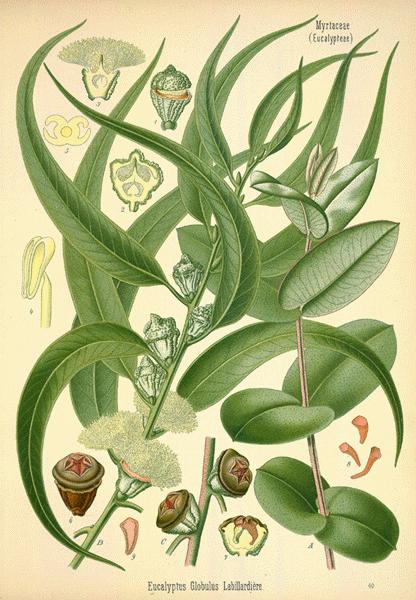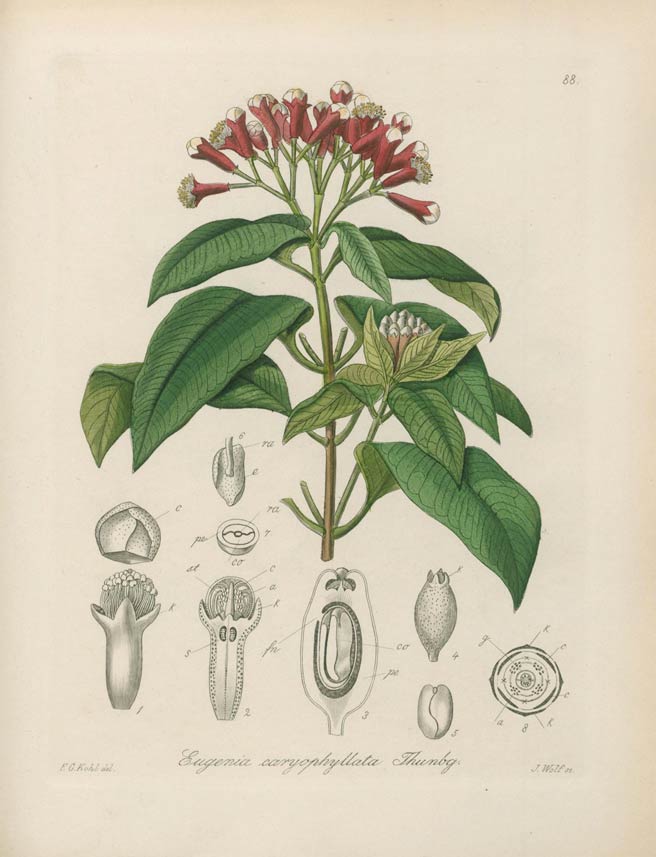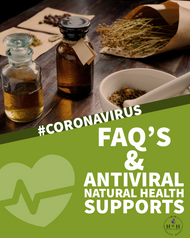Coronavirus: The WHO, FAQ’s & Antiviral Natural Health Supports
Posted by T. Schuur | Integrative Health Practitioner | Aromatherapist | Herbalist | Botanical Chemistry & Formulation on 29th Jan 2020
With the Coronavirus death toll in China reaching 106 lives, and cities being forced into lockdown, I wanted to share a little information about the virus, what it is and ways that we can mitigate personal health risks!

The following is directly excerpted from the World Health Organization’s Coronavirus page.
Coronaviruses (CoV) are a large family of viruses that cause illness ranging from the common cold to more severe diseases such as Middle East Respiratory Syndrome (MERS-CoV) and Severe Acute Respiratory Syndrome (SARS-CoV). A novel coronavirus (nCoV) is a new strain that has not been previously identified in humans.
Coronaviruses are zoonotic, meaning they are transmitted between animals and people.
Detailed investigations found that SARS-CoV was transmitted from civet cats to humans and MERS-CoV from dromedary camels to humans. Several known coronaviruses are circulating in animals that have not yet infected humans.
Common signs of infection include respiratory symptoms, fever, cough, shortness of breath and breathing difficulties. In more severe cases, infection can cause pneumonia, severe acute respiratory syndrome, kidney failure and even death.
#WHO Public Recommendations
The World Health Organization Novel Coronavirus (2019-nCoV) Advice for the Public
WHO’s standard recommendations for the general public to reduce exposure to and transmission of a range of illnesses are as follows, which include hand and respiratory hygiene, and safe food practices:
- Frequently clean hands by using alcohol-based hand rub or soap and water;
- When coughing and sneezing cover mouth and nose with flexed elbow or tissue – throw tissue away immediately and wash hands;
- Avoid close contact with anyone who has fever and cough;
- If you have fever, cough and difficulty breathing seek medical care early and share previous travel history with your health care provider;
- When visiting live markets in areas currently experiencing cases of novel coronavirus, avoid direct unprotected contact with live animals and surfaces in contact with animals;
- The consumption of raw or undercooked animal products should be avoided. Raw meat, milk or animal organs should be handled with care, to avoid cross-contamination with uncooked foods, as per good food safety practices.
The following is a list of natural health supports to help protect yourself and other from getting sick. It is evidence based phytotherapy that has been researched and verified by HgH Integrative Aromatics Certified Aromatherapist and Herbalist:
In addition to the standard recommendations offered by the World Health Organization, research indicates that using essential oils that are known anti-virals can support staying healthy.
Coronavirus is transmitted by the respiratory route and as such inhalation of antiviral essential oils can offer strong support.
Some essential oils are antiviral and can add an extra layer of protection for you and your family. They work by neutralizing harmful airborne particles and by eradicating pathogens on contact even at low doses.
An objective non-partisan study from France shows that the following 6 essential oils killed an impressive 206 out of 210 colonies of harmful microbes, including the highly-contagious H1N1 influenza strain. (1)

Eucalyptus (Eucalyptus globulus)
The vapour in eucalyptus oil kills the influenza virus after just 10 minutes, a study in Essence Journal reveals. Eucalyptus is highly recommended for opening the nasal passages and breaking up congestion. It also protects your lungs from inflammation and stimulates infection-fighting antibodies.(2)
 Cinnamon (Cinnamomum zeylanicum)
Cinnamon (Cinnamomum zeylanicum)
In the same Essence Journal study, cinnamon was able to completely eradicate influenza virus. Rich in antioxidants, cinnamon oil is a natural antimicrobial, containing several anti-inflammatory compounds.(3)
 Clove (Syzygium aromaticum)
Clove (Syzygium aromaticum)
No bacteria, virus or fungi can survive when exposed to clove oil. It’s considered such a powerful anti-bacterial, The Atlantic Magazine suggests it’s one essential oil that may start replacing antibiotics. Clove also kills highly-contagious harmful strains of bacteria, including e. Coli, streptococcus pyogenes, salmonella. It also offers protection against certain skin diseases.(4,5,6)
 Rosemary (Rosmarinus officinalis)
Rosemary (Rosmarinus officinalis)
Rosemary assists in your body’s detoxification process. In addition, laboratory and animal studies show rosemary contains antioxidants that protect cells from premature death, and normalize the body’s inflammatory response.(7)
 Carrot Seed (Daucus carota)
Carrot Seed (Daucus carota)
Carrot Seed when used in aromatherapy applications, stimulates circulation as well as brain and nerve functions. Its warm, earthy, woody, and herbaceous scent has a soothing, refreshing, and grounding effect that is known to diminish feelings of fatigue, weakness, anxiety, and stress, imparting more resilient endocrine and immune functioning. Used topically, it removes bodily toxins, boosts immunity, reduces muscle and joint inflammation, and addresses fluid retention. Used medicinally, Carrot Seed essential oil lowers blood pressure, facilitates the healing of infected skin and wounds, soothes sore throats and hiccups, and alleviates ailments caused by viruses. Clinical evidence provides proof of its antiviral, antibacterial and anti-fungal properties. (8)

Oregano (Origanum vulgare)
Oregano oil is an herbal supplement that's known for its antiviral, antibacterial, antimicrobial, anti-fungal, anti-inflammatory, and antioxidant properties. It contains several healing compounds, such as carvacrol, thymol, and terpinine. Traditionally it has been used for respiratory health, and it’s also become a popular alternative remedy for a variety of cold and flu symptoms. (9)
Antiviral Essential Oils (1)
Cinnamon Bark Essential Oil (Cinnamomum zeylanicum), Carrot Seed Essential Oil (Daucus carota), Eucalyptus Essential Oil (Eucalyptus globulus), Rosemary Essential Oil (Rosmarinus officinalis)
Anti-Fungal Essential Oils (1)
Cinnamon Bark Essential Oil (Cinnamomum zeylanicum), Carrot Seed Essential Oil (Daucus carota), Clove Essential Oil (Syzygium aromaticum) and Oregano Essential Oil (Origanum vulgare)

Usage and Safety
- Non-pregnant Adults & Children Over 3: Put 3-6 drops of essential oil/s on cotton pad, aromatherapy patch or personal inhaler and inhale for 2 mins several times a day OR dilute 2 drops in dap of lotion or aloe gel and apply directly under nose!
- For Children: Dilute all essential oils for children
- For Pregnant Women 24 Weeks and Less: Use Lemon essential oil if pregnant before 24 weeks
- For Pregnant Women 24 Weeks and More: Bergamot can be added to the Lemon essential oil after 24 weeks.
Clinical Studies on Antiviral, Antibacterial and Anti-Fungal Activity (1)
In clinical studies testing antiviral abilities, these essential oils significantly reduced viral units for H1N1 (reduction of greater than 99%) and HSV1 (reduction of greater than 99.99%).
In clinical studies testing antibacterial abilities these essential oils were proven effective against GRAM Positive and GRAM Negative bacteria as well as effective against antibiotic‐resistant strains Pseudomonas aeruginosa, Staphylococcus aureus MERS, and Escherichia coli E-COLI.
In clinical studies testing anti-fungal abilities these essential oils were proven to be fungistatic and fungicidal activities against all Candida strains tested.
Antiviral Blends, Soaps and Sanitizers
Any certified aromatherapist is educated in which oils are the most antiviral and can guide you in the proper amounts of each essential oil required or make you a bottle of a strongly antiviral essential oil blend!
Also, as good hand washing with soap is imperative at any time, it can be doubly effective in its antiviral capability by adding essential oils to a good unscented natural hand soap.
A natural antiviral gel is also a safe alternative and a low cost health investment. Created with natural ingredients that are nourishing to the skin, and potent in its power thanks to the added antiviral essential oils.
Just as with any health supplement, quality matters as do the amounts used of individual constituent, as well as proper dosage consideration related to age, health status and pharmaceutical usage.
Essential oil products sold at your local grocery or drug store are most likely of very poor quality, are likely adulterated and won’t act in the ways that are indicated by this study. To achieve this protection for you or your kids from the flu, ensure you are using high grade, pure essential oils.
In order to protect yourself and your family for viral, bacterial and fungal aggressors, you need an expertly-crafted blend of these essential oils. If you’re a do-it-yourself type, buying the oils individually and looking up recipes online to make this blend is also risky and will not take into consideration the unique factors of you and your families health.
Sources:
- https://www.ncbi.nlm.nih.gov/pmc/articles/PMC5552930/
- http://www.essencejournal.com/pdf/2014/vol2issue1/PartA/8-565.pdf
- https://www.ncbi.nlm.nih.gov/pmc/articles/PMC4003790/
- https://www.ncbi.nlm.nih.gov/pmc/articles/PMC37690...
- https://www.theatlantic.com/health/archive/2015/01...
- https://www.ncbi.nlm.nih.gov/pubmed/28407719
- https://www.ncbi.nlm.nih.gov/pmc/articles/PMC32032...
- https://www.ncbi.nlm.nih.gov/pmc/articles/PMC4769755/
- https://www.ncbi.nlm.nih.gov/pmc/articles/PMC52064...
